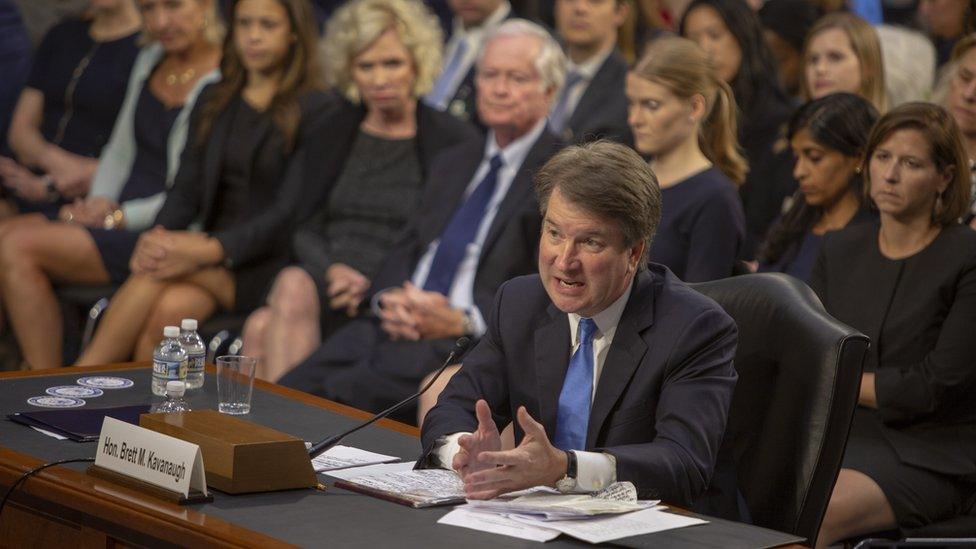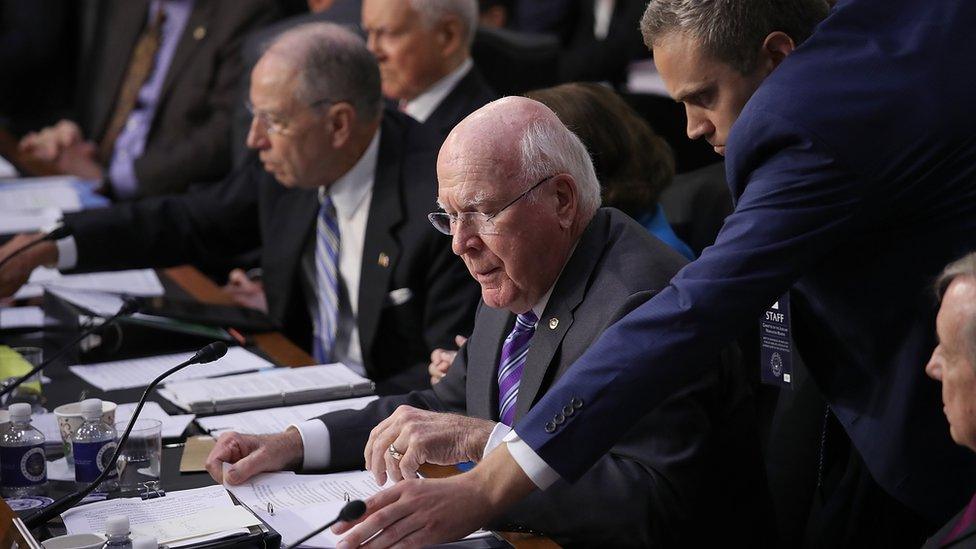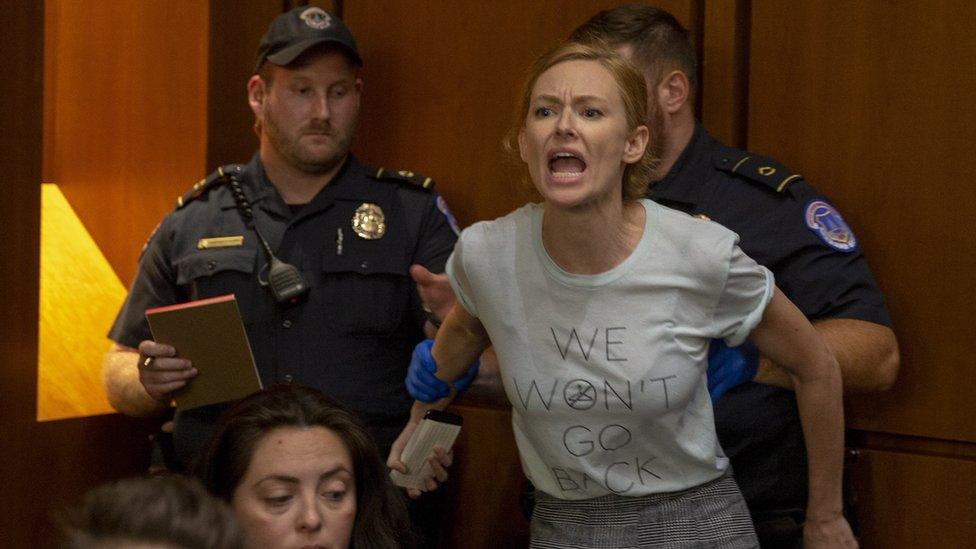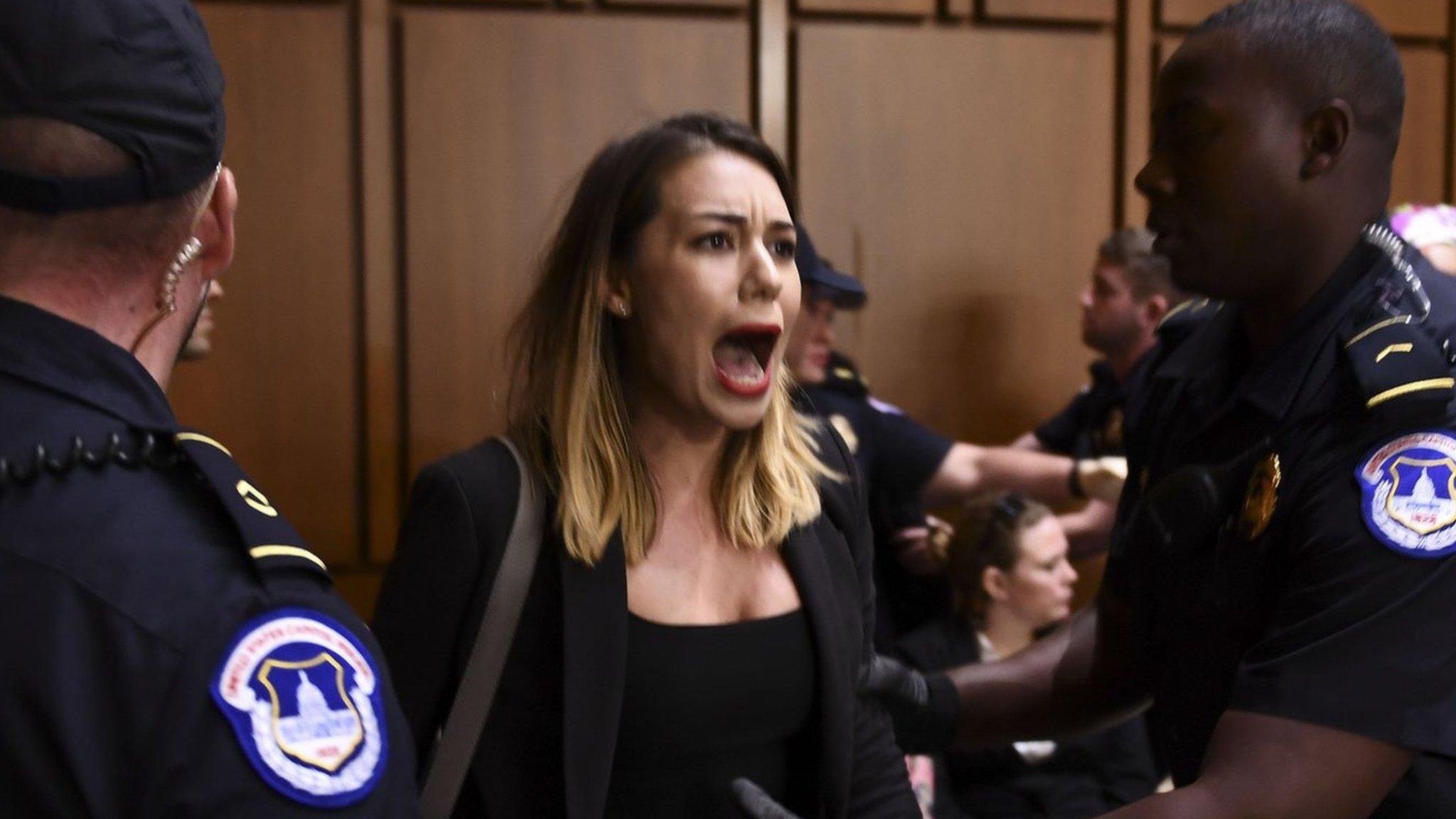Brett Kavanaugh, Supreme Court nominee, sidesteps subpoena question
- Published

Brett Kavanaugh insists judicial independence is key to the constitutional system
US President Donald Trump's Supreme Court nominee has declined to say whether he thinks sitting presidents can be made to comply with a legal subpoena.
The court order forces a witness to appear to give testimony.
In a second day of Senate hearings, Brett Kavanaugh said no-one was above the law but he would not be drawn on what he called a hypothetical question.
He also declined to say if he thought presidents could pardon themselves.
The BBC's Gary O'Donoghue, in Washington, says the investigation into alleged collusion between the Trump campaign and Russia in the 2016 election has raised important constitutional questions about the extent to which an incumbent president can be forced to co-operate.
Democrats are keen to push Mr Kavanaugh on the issue, he adds.
Mr Kavanaugh, 53, who faces a four-day confirmation hearing before the Senate Judiciary Committee, was also pressed on his approach to gun rights and the law around abortion.
He said he understood the importance of the precedent in the landmark 1973 case, Roe v Wade, which legalised abortion nationwide, pointing out it had been reaffirmed by the Supreme Court several times.
If confirmed, the conservative appeals court judge would be expected to tilt the court's balance to the right.
What did Kavanaugh say?
Chuck Grassley, the Republican chairman of the Judiciary Committee, asked Mr Kavanaugh whether he would have any trouble ruling against the president who nominated him, to which he responded: "No-one is above the law in our constitutional system."
"I think the first quality of a good judge in our constitutional system is independence," he added.
Senior Democrat Dianne Feinstein asked if he thought a sitting president could be "required to respond to a subpoena".
"I can't give you an answer on that hypothetical question," Mr Kavanaugh said.

Senator Patrick Leahy was among those who pressed Mr Kavanaugh
He gave a similar answer to Democratic Senator Patrick Leahy who asked whether a president could issue a pardon to himself or to someone else in exchange for promising not to testify against the president.
In a tweet in June, President Trump said he had "the absolute right to PARDON myself".
On abortion, Mr Kavanaugh said he understood people's strong feelings and he described Roe v Wade as "an important precedent of the Supreme Court that has been reaffirmed many times".
Supporters of abortion rights fear Mr Kavanaugh could provide the decisive fifth vote on the nine-seat court to overturn the 1973 ruling.
On the issue of gun rights, Senator Feinstein pressed Mr Kavanaugh on his previous opposition to a ban on semi-automatic rifles. Such weapons have been used in a string of deadly high school shootings.
"Of course the violence in the schools is something we all detest and want to do something about," Mr Kavanaugh said, but added that handguns and other semi-automatic weapons were also used for hunting and self-defence.
Was the confirmation hearing orderly?
For a second day, protesters interrupted proceedings before being removed by security personnel.
On Tuesday, there were angry scenes minutes after Mr Kavanaugh entered the committee rooms. The hearing was disrupted by angry shouts from members of the public and lawmakers alike.

Protesters again tried to disrupt the confirmation hearing on Wednesday
Texas Republican John Cornyn said it was "the first confirmation hearing for a Supreme Court justice I've seen basically according to mob rule".
The US Capitol Police said 61 people were removed from the committee room on Tuesday and arrested for disorderly conduct.
Is Kavanaugh expected to get through?
Republicans have a slim majority in the 100-seat upper house. They can confirm Mr Kavanaugh if they stay united. So far, there are no signs of Republican defections.
Not all Democrats have said they will oppose Mr Kavanaugh, and several may even support his nomination.
The Senate is likely to vote on confirmation by the end of the month. The court begins its next term in October.
What is Kavanaugh's background?
He studied law at Yale and is a resident of the wealthy Washington suburb of Chevy Chase.
He worked under special counsel Kenneth Starr in his investigation into President Bill Clinton's relationship with intern Monica Lewinsky in the 1990s.
Under George W Bush, he served as deputy White House counsel and, from 2003-06, as Mr Bush's staff secretary.
A Catholic, he has been a US Court of Appeals judge in Washington for the past 11 years.
- Published4 September 2018
